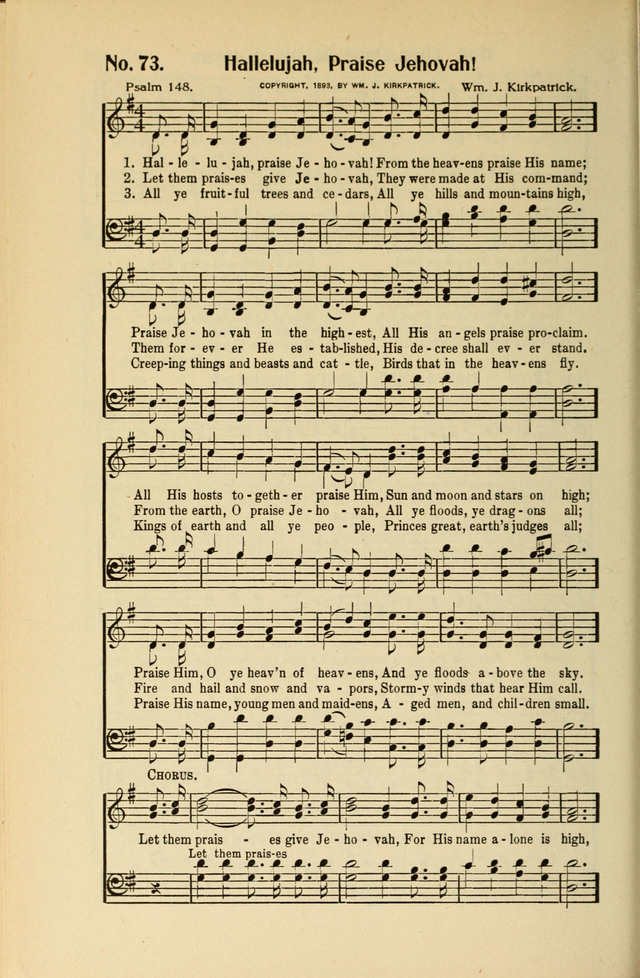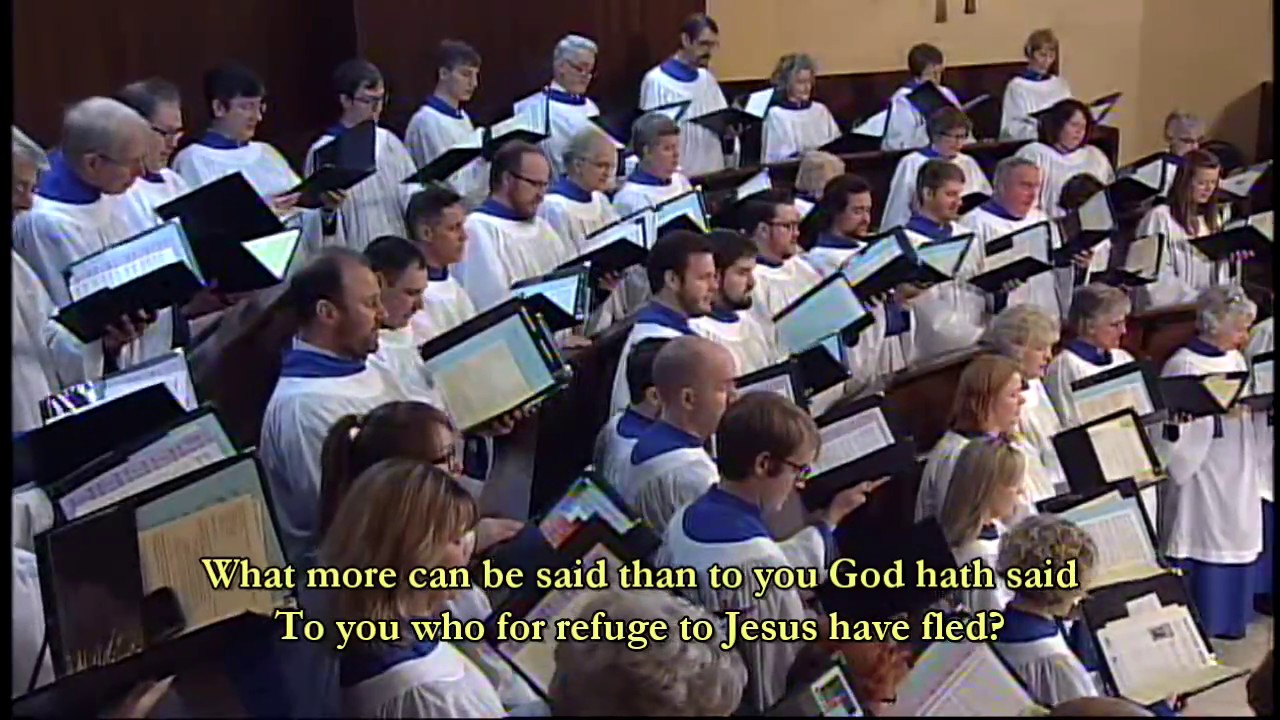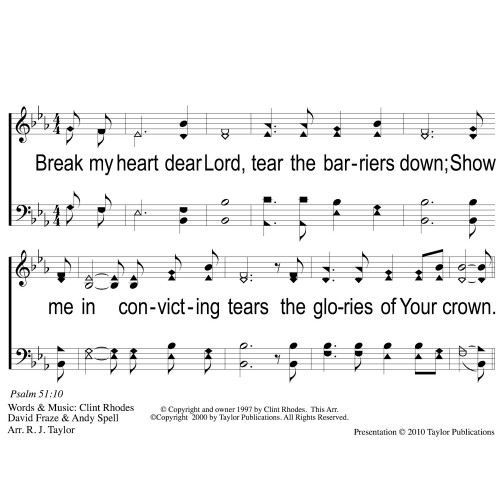Blog
Hymn Theory
The 50 Greatest Hymns of All Time
Friday, May 01, 2020
I generated this list using three criteria:
- DOCTRINAL DEPTH. Does the hymn have something spiritually meaningful to say? Is its meaning profound or superficial?
- CONGREGATIONAL SUITABILITY. Is the hymn simple enough that an average a-cappella congregation (80 in attendance on Sunday morning) can sing it easily?
- CONGREGATIONAL APPEAL. Do worshipers enjoy singing this hymn? Is it widely used?
Additionally, I did not consider (and will not include) any hymn written by me or by anyone I know to avoid introducing bias.
There are many worthy hymns that did not make the Top-50 cut. If you think an omitted hymn should be on the list, leave a comment identifying both it and the hymn that you think it should replace. You may change my mind!
Abide with Me (1847)
All Hail the Power of Jesus’ Name (1779)
All People That on Earth Do Dwell (1560)
Be Still, My Soul (1752)
Be with Me, Lord (1935)
Footprints of Jesus (1871)
For the Beauty of the Earth (1864)
Give Me the Bible (1883)
Great Is Thy Faithfulness (1923)
Hallelujah! Praise Jehovah! (1893?)
Hallelujah! What a Savior (1875)
He Hideth My Soul (1890)
Higher Ground (1892)
How Deep the Father’s Love (1995)
How Firm a Foundation (1787)
I Am Thine, O Lord (1875)
I Need Thee Every Hour (1872)
In Christ Alone (2001)
In the Hour of Trial (1834)
It Is Well with My Soul (1873)
Jesus, Draw Me Ever Nearer (2001)
Just As I Am (1834)
Lord, We Come Before Thee Now (1745)
My Jesus, I Love Thee (1862)
Nearer, My God, to Thee (1840)
Nearer, Still Nearer (1898)
O Worship the King (1833)
On Zion’s Glorious Summit (1803)
Only in Thee (1905)
Our God, He Is Alive (1966)
Purer in Heart, O God (1877)
Something for Thee (1862)
Stand Up, Stand Up for Jesus (1858)
Sun of My Soul (1820)
Sweet By and By (1867)
Sweet Hour of Prayer! (1845)
Take Time to Be Holy (1874)
Teach Me Thy Way (1919)
The Battle Belongs to the Lord (1985)
The Last Mile of the Way (1908)
The Solid Rock (1836)
There Is a Habitation (1882)
This World Is Not My Home (1919)
Though Your Sins Be as Scarlet (1887)
‘Tis Midnight, and on Olive’s Brow (1822)
Trust and Obey (1887)
Victory in Jesus (1939)
We Saw Thee Not (1834)
When I Survey the Wondrous Cross (1707)
Why Did My Savior Come to Earth? (1892)
A Gender-Neutral God in Hymns
Thursday, April 09, 2020
The other day, I found myself going through some hymns of hope and comfort that a hymn blogger has been posting daily through the coronavirus pandemic. The style (organ plus choir) isn’t my thing; from my perspective, you’ve got a nasty instrument drowning out the good parts. However, the hymns themselves were generally quite good, even the ones we don’t sing, like “All My Hope on God Is Founded”.
In time, I came to this version of “How Firm a Foundation”. I was particularly interested in it; after all, the very title of my blog comes from the hymn! Rather than the lyrics I’ve known all my life, though, here’s how the first verse went:
How firm a foundation, you saints of the Lord,
Is laid for your faith in God’s excellent word;
What more can be said than to you God has said,
You who unto Jesus for refuge have fled?
My first thought was, “Ewww! Were the hymnal editors allergic to pronouns?” My second thought was, “No; they’re only allergic to masculine pronouns.”
Gender-neutrality in hymns has been a topic of discussion for several decades if not more. I find some forms of it to be utterly unobjectionable (writing hymns that refer to both men and women) and others to be mildly so (rewriting older hymns to refer to both men and women). However, I have serious problems with taking hymns that refer to God as Father and King and rewriting them so that God is no longer even masculine.
First, the only way to justify such a change is to perform some dramatic surgery on the Bible too. How many times in Scripture is God a He or a Him? How many times in the New Testament is He the Father? How many times in the Psalms is He King? Reading out of a Bible that says such things on the one hand and singing hymns that deny their truth on the other creates massive cognitive dissonance.
(Yes; I am aware that there are Scriptural texts--Isaiah 49:15, for instance--that compare God to a woman. In 1 Thessalonians 2:7, Paul compares himself to a woman. That doesn’t mean that Paul was feminine.)
To be quite frank, we live in a society that needs to spend more time considering the patriarchal authority of God, not less. I don’t think it’s coincidence that the same folks who deny God’s masculinity also reject what the word of God has to say about sex and gender roles (and many other things). At that point, regardless of what they might think about their “worship”, they are not prostrating themselves before Him in any meaningful sense. We don’t need hymnals that encourage us to abandon reverence and subjection. We need the opposite.
Finally, it shows a great deal of disdain for the hymnists of earlier eras, their convictions, and their work. I’m as sure as I can be that if I had asked Robert Keene (the probable author of “How Firm a Foundation”) if God was masculine, he would have replied incredulously, “Of course!”, and he certainly would not have approved stripping out the evidence of His masculinity from his hymn.
Such lack of respect is par for the course for our amnesiac society. We are very concerned about diversity and honoring the views of people from the different cultures of our time, but we have zero interest in (dead white male) voices from the cultures of the past. In fact, we’re so willing to stifle them that we’ll do a hack job on a great hymn, rendering a beautiful line ugly and graceless, just to make sure that it expresses our viewpoint rather than the author’s. Diversity that ain’t.
In Romans 8:15, Paul notes that we have received a spirit of adoption as sons, by which we cry out, “Abba! Father!” If, on the other hand, we no longer are willing to cry out, “Abba, Father!”, well, that too reveals a great deal about the spirit that is in us.
"Holy Ground" and Singing What's Led
Friday, November 08, 2019![]()
Recently, a friend asked me what I thought of the praise song “Holy Ground” and whether we should sing it in worship. There are a couple of songs with that title, but I think the version he’s talking about is this one. It doesn’t really matter; the other “Holy Ground” says similar things. Apparently, the argument goes that the idea of a church building being holy ground is unscriptural, so we shouldn’t sing it.
I have a couple of problems with that. First, I’m not entirely sure that it’s correct. As I understand things, in Scriptural terms, something is holy when it is dedicated to God’s purposes.
Isn’t that true of our church buildings? If that’s not true, if we don’t believe that our church buildings should be dedicated entirely to God’s purposes, why do we object so strenuously to church buildings containing fellowship halls, gyms, and so forth? Conversely, if they are dedicated entirely to God’s purposes (like the meat of sacrifices under the Law, for instance), isn’t there at least a sense in which they are holy?
However, even stipulating that the above is not true, there’s another problem with objecting to “Holy Ground”. Sure, it’s possible to read the lyrics as being about the literal floor of the church building. However, it’s equally possible to read them metaphorically. “We are standing on holy ground,” is a clear reference to Exodus 3:5.
When we sing “Holy Ground”, then, we are putting ourselves in the position of Moses, in the same way that we put ourselves in the position of the apostles in the boat when we sing “Master, the Tempest Is Raging” and of Mary Magdalene when we sing “In the Garden”. Nobody objects to either because we aren’t really on the Sea of Galilee or really standing in front of Joseph’s tomb. Why is it problematic that we aren’t really in front of the burning bush either?
All of this raises a larger issue, though: the question of how we deal with hymns with questionable content when we are invited to sing them in the assembly. The first approach is to object to any song that could be misunderstood. This leads to discouraging others by our refusal to sing, strife in the church, and ultimately the compilation of a “ban list” that excludes many of our richest hymns.
Do we axe “The Solid Rock” because the last verse can be read as Calvinist (and indeed was written by a Calvinist)? How about “Amazing Grace”, which easily can be read as proclaiming salvation by faith only (which John Newton believed in)? Sad to say, a great many of the hymns that can survive such hostile scrutiny are those that don’t have much content in the first place. They might be “Scriptural”, but when it comes to the Colossians 3:16 goals of teaching and admonishing, they’re nearly useless.
Instead of asking if a hymn can be understood wrongly, we’re far better off asking if it can be understood rightly. Is there a way that I can square singing this hymn with my conscience? This is the option that I prefer. I certainly have my share of opinions about good and bad hymns, but I will almost never refuse to sing a hymn, nor even talk to a song leader about that hymn after services.
First of all, who am I to tell somebody they’re worshiping wrong when they very well could be worshiping right? Second, when my brother is pouring out his heart in worship, do I really want him to glance over and see me sitting there mutely with an expression on my face like I’d just bitten into a green persimmon? Third, doesn’t refusing to sing boil down to looking for reasons not to praise God, rather than reasons to praise Him? If that’s where my heart is, I’m not OK with that.
In real life, if offered the opportunity to lead singing, I’m probably not going to lead “Holy Ground”. I think there are better options out there. However, if I’m in the pews, and I’m asked to sing “Holy Ground”, I will do so.
I will think about Moses. I will reflect on the holiness that God’s presence demands. Generally, I will do my best to sing with spirit and understanding in the hope that my brethren will be edified and my God will be glorified.
Hymn critique has its place, but the assembly isn’t it.
"The Lord Is My Light" and Despair
Friday, November 01, 2019
During our monthly singing last Sunday evening, we sang Charli Couchman’s “The Lord Is My Light”. I love the hymn. I think it’s one of Charli’s best, and indeed one of the best hymns written by brethren in the 20th century.
“The Lord Is My Light” is based on Psalm 27, and as psalm paraphrases tend to, it has excellent content. My favorite line appears in the second verse. It reads, “I will not despair; Your goodness sustains me.” Charli took it from the NASB ’77 reading of Psalm 27:13.
The path from David’s original in v. 13 to “The Lord Is My Light” is an interesting one. Apparently, there is a divergence in manuscripts. Some of them read as reflected in the ESV, “I believe that I shall look on the goodness of the Lord in the land of the living.”
The other reading (followed by the NASB, the NKJV, and older translations, says something like, “Oh! Had I not believed that I shall. . .” In other words, if I had not believed that I would see God’s goodness, it would have been bad. The original NASB tried to capture this thought by saying, “I would have despaired unless I had believed that I would see the goodness of the Lord in the land of the living.”
That’s a neat idea, but its expression is about as elegant as a snoring teenager (par for the course for the NASB, alas!). Charli had a meter to fit, as hymnists always do, so she compacted the concept to the form it takes in “The Lord Is My Light”.
However, as is often the case with paraphrase, something was both lost and gained. The NASB rendering is retrospective. It looks back on trial and says, “I wouldn’t have gotten through that, except for my faith in God.”
Charli’s version is more daring. Much more. It is prospective. It looks to the future and defiantly proclaims that it will not lose heart. I will not despair, no matter what!
That’s the spiritual equivalent of signing a blank check and giving it to somebody else. It is a promise to continue steadfastly, regardless of how many zeroes of trial life may fill in. Bring it on, time and chance! Bring it on, devil! I still won’t despair.
In isolation, such a promise is brash, almost foolhardy. Aren’t you aware of all the disasters that can happen to a human being in this fallen world? Who knows what horrible things your future may hold?
“The Lord Is My Light”, though does not focus on all the unknowns. It focuses on the one known. It focuses on the certainty that God will be faithful to perform what He has promised. His goodness need not even appear now to sustain us. As long as we remain convinced that it will appear, that hope is sufficient to reassure us.
I sing all of “The Lord Is My Light” with great joy, but I especially love to sing that promise. I will not despair. Not ever. I don’t care if Satan and all his angels hear it. Indeed, I hope they do! However, my boast is not in my own strength of character. It is entirely in the sustaining goodness of God.
Why "Break My Heart" Works
Wednesday, April 24, 2019

At the end of this year’s new-hymn class at Jackson Heights, we went through and recorded a dozen of the songs we’d learned through the quarter. I’ve spent the past couple of days listening to the CD in the car, not only from a worshiper’s perspective, but from a hymnist’s perspective.
Over the past decade, I’ve slowly learned that there are some things you can’t tell about a hymn or spiritual song until you sing it. For one, there are some arrangements that look fine on the page but prove to be a booger to sing. Most importantly, though, you can’t tell whether a hymn will generate buy-in from brethren until you hear them sing it. There is a difference in sound between singers going through the motions and singers pouring out their hearts in worship.
Buy-in is the single most important attribute of a spiritual song. It determines whether it will be used congregationally or not. If a hymn does not have buy-in, it’s like faith without works. It doesn’t matter how skillfully written or intellectually profound the hymn is. If people don’t want to sing it, it’s dead.
As I was listening to the CD, then, I was listening for the telltale evidence of buy-in. I heard it, among several other places, in the Clint Rhodes song “Break My Heart”. “Break My Heart” is written in a style I don’t use. If I had been invited to edit it, I would have had some technical critiques to offer.
However, if a sacred song draws Christians into worship, it’s doing its job, and “Break My Heart” manifestly does that. I think it works, and I think it works for two reasons:
Accessible Content. “Break My Heart” is a song about the Christian’s struggle with sin. Particularly, it’s about the times when we don’t want to do good, but we want to want to. It’s a plea to God to overcome the stubborn resistance within us so that we can devote ourselves to Him.
Every Christian with an ounce of self-awareness will identify with this struggle. All of us will wrestle with sin for as long as we live, and that conflict exists because our flesh wants to sin. We need God’s help, we know we need God’s help, and so we want to sing a song that is about asking God for help.
Use of Counter-Melody. Recently, I’ve been reflecting a lot on the difference between songs written for a praise band and songs written for the congregation. There are a lot of things that praise bands can do that congregations can’t. Most notably, they can have a more extreme vocal range and use more complicated rhythms. G5 in the melody will murder congregations on Sunday mornings. So too will those dotted-eighth/sixteenth rhythms that mimic the vocal stylings of a lead singer.
However, there are things that congregations do well that praise bands really don’t. First on my list is the employment of counter-melody. Typically, the lead singer of a praise band is The Lead. They don’t want to step back and let somebody else in the band take over for a little bit.
However, congregations enjoy passing the melody back and forth or singing two melodies simultaneously with different rhythms. Many of the most prominent songs that come from a-cappella traditions reflect this. Think “Our God, He Is Alive”, for instance. The same is true of “Break My Heart”. The song really comes alive once you get to the chorus and the alto/tenor counter-melody. They make it musically satisfying.
Fundamentally, I’m a pragmatist. What ought to be is all well and good, but you have to pay attention to what works. “Break My Heart” works, at least in a group that can pull off a tenor counter-melody. Both song leaders and writers ought to pay attention.


